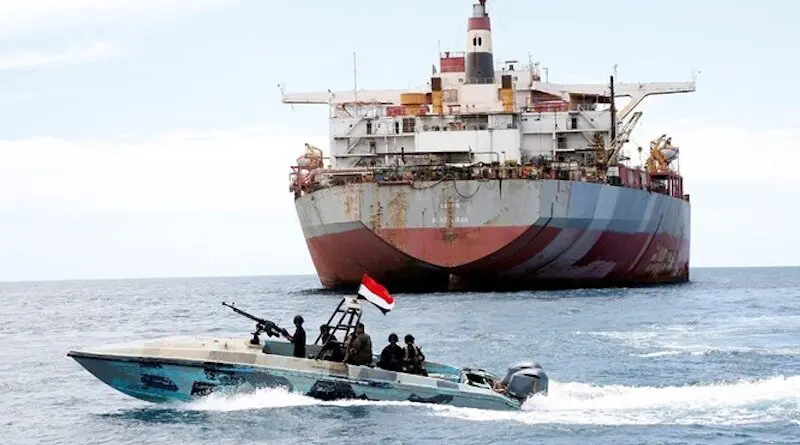Red Sea On Edge: Houthis Attacks Disrupt Trade And Threaten Maritime Security – OpEd
The Red Sea, a vital artery for global trade, has become a hotspot of tension due to a surge in drone and missile attacks by the Houthi rebels in Yemen. This crisis, escalating since October 2023, has disrupted maritime operations, threatened regional security, and raised concerns about environmental damage.
Notwithstanding the claims of Ansarullah (Houthis) regarding their actions in the Red Sea as an aid to Hamas in Gaza, the roots of the crisis actually lie in Yemen’s ongoing civil war. The Houthis, predominately a Zaidi Shia group getting political and military support from Iran, are currently holding Northern Yemen where the majority of the local population resides. The group has been fighting a bloody civil war against the Saudi-led coalition since 2014-15 against the internationally recognized Yemeni government and its allied militant groups like STC.
Initially, The Houthis began attacking commercial cargo ships en route to Israel through the Gulf of Adan and the Red Sea. Low-cost suicide drones and ballistic missiles (both supplied by Iran) were used as weapons of choice in a strategy where targets are hit when and where opportunity presents itself rather than following any traditional military planning. Soon, Bab ul Mandal became the region’s most dangerous maritime choke point. The stated purpose of Houthis action was to prevent Israel from bombing Gaza any further and forcing Tel Aviv to allow humanitarian aid to reach millions of stranded Palestinians. These actions of Houthis met with mass approval not only by local Yemenis but also by the Arab and Muslim world as a sign of resilience and courage against the tyranny of Israel. Right now, Houthis are interested in creating ripples in the international system by disrupting the maritime trade through the Red Sea and Suez Canal.
This promoted a UNSC resolution on 10th January 2024 demanding immediate cessation of Houthi attacks on merchant vessels. The US formed a maritime security alliance and retaliated by initiating Operation Prosperity Guardian; a military operation against Houthis including missile and air strikes against strongholds of Ansarullah in Northern Yemen, on 12th January 2024. Despite the presence of a strong maritime coalition, the US actions so far have failed to prevent Houthis ability of luanch missiles and drones against merchant and naval ships related to US, UK or Israel. Instead, on 4th March 2024, Misfer Al-Numair, Houthis telecommunication minister, said that a permit from Maritime Affairs Authority (under Houthis command) will have to be obtained by vessels entering Yemeni waters to be able to continue their voyage to and from Red Sea. This announcement clearly shows the limited impact of strikes by the US led coalition. Right now, coalition ships are focused on efforts to neutralize Houthis drones and Ballistic missiles. Last attack by Houthis on Barbados-flagged bulk carrier M/V True Confidence, on 6th March, 2024, left 3 crew members dead, 4 seriously injured while the ship suffered damage as well. A sophisticated Iranian origin anti-ship missile was used in this attack.
The limited impact of US strategy has sparked intelligentsia around the world where a change in the US strategy is being suggested. For example, Fatima Sizer from the Atlantic Council emphasized the need for a “multi-pronged approach” that combines military pressure with diplomatic efforts to de-escalate the situation including control of Israel’s undue aggression in Gaza which is providing justification and creating greater acceptance of Houthis actions in Red Sea. Experts like Colin Clark, a senior fellow at the Stimson Center, warn that these attacks “demonstrate the growing threat posed by non-state actors to critical maritime infrastructure.”
Furthermore, there is a dangerous potential for an environmental disaster on a massive scale. UK-flagged “Rubymar,” was carrying fertilizer when Houthis attacked it. A spill of chemicals could devastate the Red Sea’s fragile ecosystem.
The Houthis demand an end to the Saudi-led airstrikes and the lifting of the blockade on Yemen while they also demand halt in Israeli attacks on Gaza and allowing humanitarian aid to reach Gaza. It looks like Houthis are pursuing multiple political and strategic objectives;
- To increase their acceptance and popularity among Arab masses in the region.
- To gather larger political gains against rival STC (Southern Transition Council) among local population of Yemen.
- To increase pressure on Saudi backed groups in Southern Yemen for control over Yemen’s natural resources.
This makes it clear that though Red Sea crisis is linked to Hamas-Israel conflict in Gaza, it also has domestic dimensions as well. It is not a simplistic military dispute but a compounded local and regional conflict involving neighboring nations Saudi Arabia and UAE.
The Houthi attacks have targeted commercial vessels from various countries, including the US, UK, and Saudi Arabia. While no ships have sunk, the damage and threat have significantly impacted regional maritime trade.Insurance premiums have risen considerably. Most significant impact has been the rerouting of cargo ships through African ports increasing their travel time and fuel cost by 3 times. Some companies have ceased their operations in the region completely. This has led to delays and disruptions in the flow of goods, potentially impacting global supply chains.
The crisis in the Red Sea poses a significant threat to regional stability and maritime trade. It is a complex issue having both internal, external, and regional dynamics. Addressing it requires a comprehensive approach that combines diplomacy, targeted military action, and international cooperation. The civil war in Yemen and the situation in Gaza must be improved on humanitarian grounds as soon as possible to take any justification away from Houthis. Unfortunately, the Red Sea may remain a flashpoint for conflict for the foreseeable future.

